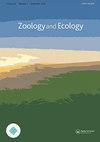Population development of three sympatric dove species in African acacia savanna following a drought
Q4 Environmental Science
引用次数: 0
Abstract
The breeding densities of three dove species: Laughing Dove Spilopelia senegalensis, Ring-necked Dove Streptopelia capicola, and Mourning Collared Dove Streptopelia decipiens were studied by means of the territory mapping method in 400 ha of acacia savanna in northern Namibia. About half of the study area comprised cultivated fields, orchards, sport fields and human settlements. The study was conducted in February–June 2020, after a prolonged drought in 2017–2019. During the drought, most doves vacated their territories and ceased to breed, but breeding populations recovered rapidly. The overall population density of all species was the highest in February/March (30.3 pairs / 100 ha), intermediate in April (27.8), and lowest in May/June (23.5). Population densities were higher in the man-modified than in natural savanna. While the population densities in natural savanna significantly increased with the advance of the dry season, in man-modified savanna the densities decreased slightly.干旱后非洲金合欢稀树草原三种同域鸽子种群发展
在纳米比亚北部400 ha金合欢热带草原上,采用领土作图法研究了3种鸽子的繁殖密度:笑鸽(Spilopelia senegalensis)、环颈鸽(Streptopelia capicola)和哀颈鸽(morncollar dove Streptopelia deciens)。大约一半的研究区域包括耕地、果园、运动场和人类住区。该研究是在2017-2019年长期干旱之后,于2020年2月至6月进行的。在干旱期间,大多数鸽子离开了它们的领地,停止了繁殖,但繁殖种群迅速恢复。总种群密度以2 / 3月最高(30.3对/ 100 ha), 4月居中(27.8对/ 100 ha), 5 / 6月最低(23.5对/ 100 ha)。人工改造的草原种群密度高于天然草原。随着旱季的推进,天然稀树草原种群密度显著增加,而人工改造稀树草原种群密度略有下降。
本文章由计算机程序翻译,如有差异,请以英文原文为准。
求助全文
约1分钟内获得全文
求助全文
来源期刊

Zoology and Ecology
Agricultural and Biological Sciences-Animal Science and Zoology
CiteScore
1.00
自引率
0.00%
发文量
1
 求助内容:
求助内容: 应助结果提醒方式:
应助结果提醒方式:


